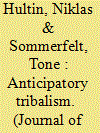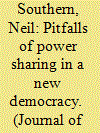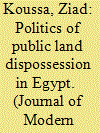|
|
|
Sort Order |
|
|
|
Items / Page
|
|
|
|
|
|
|
| Srl | Item |
| 1 |
ID:
173866


|
|
|
|
|
| Summary/Abstract |
This article examines the upsurge in denunciations of ‘tribalism’ in public debate during The Gambia's transition from the autocracy of Yahya Jammeh to the ‘New Gambia’ under President Adama Barrow. In these public debates, derogatory statements about particular ethnicities articulate fears of present or future alliances to monopolise political power. These fears are disproportionate to attempts of organised political mobilisation on ethnic grounds, which remain marginal. It is argued that accusatory politics are a salient, and neglected, feature of ethnic dynamics in contemporary Gambian – and African – politics. This politics of accusation involves the contestation and negotiation of moral legitimacy in the political sphere, in a manner challenging the separation of the moral and the political undergirding scholarly distinctions between ethnicity and tribalism.
|
|
|
|
|
|
|
|
|
|
|
|
|
|
|
|
| 2 |
ID:
173864


|
|
|
|
|
| Summary/Abstract |
Social capital research has measured the concept in two distinct ways: through direct reporting by participants in cross-national surveys and the presence of associative organisations. Both strategies raise difficulties: the former restricts comparability and assumes group stability; the latter relies on literal translation and uses direct questioning. We problematise these approaches and argue that the ratio of ‘check-points’ where individuals are asked to demonstrate adherence to rules, and ‘trust-points’ where such proofs are not required, can better measure social capital. Moreover, the unevenness of social capital between groups is perceptible by ‘fast-lanes’ that differentially treat individuals based on identity. Evidence from a field survey and observational evidence in South Africa is presented.
|
|
|
|
|
|
|
|
|
|
|
|
|
|
|
|
| 3 |
ID:
173863


|
|
|
|
|
| Summary/Abstract |
South Africa faces interconnected challenges of developing and diversifying its economy and adapting to and mitigating the impacts of climate change. A green policy tilt is ascendant in the country, manifest in a cascading array of policies and special initiatives. Utilising concepts from the multi-level perspective on socio-technical transitions, we assess Africa's first designated Green Special Economic Zone (SEZ), Atlantis SEZ (ASEZ) in the Western Cape, a niche innovation aimed at transforming the Province's industrial base. This initiative is very ambitious in four respects: (1) it links green SEZ development in a deprived metropolitan area to the broader regional economy; (2) it utilises an innovative governance structure; (3) it promises localization economies and export potential; and (4) it connects SEZ niche experimentation with emergent renewable energy regimes. While elements are in place which might seed a sociotechnical transition, societal and political forces (i.e. landscape features) continue to limit its realisation, highlighting the immanent, structural realities shaping South Africa's economic futures.
|
|
|
|
|
|
|
|
|
|
|
|
|
|
|
|
| 4 |
ID:
173867


|
|
|
|
|
| Summary/Abstract |
A key political feature of South Africa's transformation was the African National Congress, the National Party and Inkatha Freedom Party working together in a grand coalition. This arrangement was praised by leading power-sharing theorist Arend Lijphart. The unity government began in 1994 but two years later the National Party withdrew. This article explores power sharing during the initial phase of the settlement and discusses three aspects of it. First, the South African example points to the electoral drawbacks of power sharing for minor parties. Second, the National Party's participation in the coalition stifled the early development of substantial political opposition which slowed the pace of democratic consolidation. Third, participation in a power-sharing arrangement undermined the National Party's electoral fortunes contributing to its dissolution in 2005. This was an unexpected outcome for a party which had co-authored the country's settlement a little over a decade earlier.
|
|
|
|
|
|
|
|
|
|
|
|
|
|
|
|
| 5 |
ID:
173865


|
|
|
|
|
| Summary/Abstract |
This article examines changes in the allocation of urban land in Egypt between 1975–2011 with the rise and incorporation of state authoritarianism and neoliberal economics in what I call ‘authoritarian neoliberalism’. Authoritarian neoliberalism in Egypt transferred ownership of urban lands from public wealth to an affluent class of local and foreign capitalists – often in a non-transparent fashion. The article focuses on the government's legally sanctioned practices of subsidisations, privatisations and evictions as they relate to what I call, inspired by David Harvey's formulation, the accumulation of wealth by dispossession. Dispossession of public urban land, I maintain, generated widespread resentment that played a vital, but inadequately discussed, role in the series of revolts that culminated in the 2011 uprising in Egypt. Social tensions engendered in this authoritarian neoliberal regime, I argue, endure under the administration of President Abdel Fattah el-Sisi, who continues to transfer public urban lands, from lower to higher socioeconomic classes, at an even faster pace than his predecessor.
|
|
|
|
|
|
|
|
|
|
|
|
|
|
|
|
| 6 |
ID:
173862


|
|
|
|
|
| Summary/Abstract |
Police reform in South Africa has been a crucial component of democratic consolidation. Yet recent research presents a contrasting set of opinions, indicating low levels of public trust in the South African Police Service (SAPS), but continued belief in their right to enforce the law, and a strong sense of isolation amongst officers themselves. As police are constitutive of the officers who populate their ranks, attention should be given to how ‘democracy’ is perceived by those charged with its protection. Through a series of interviews, this article examines how SAPS officers understand and experience ‘democracy’. Situating officers in the broader society and communities in which they work, it shows that officers conceive of democracy predominantly through the lens of ‘rights’ and that their role in protecting rights is complicated by the transitional nature of South Africa's democracy. It also provides insight into a sense of disempowerment amongst officers, suggesting negative conceptions of the quality of democracy and of the balance of liberal constitutionalism with the democratic impetus of building safer communities.
|
|
|
|
|
|
|
|
|
|
|
|
|
|
|
|
|
|
|
|
|